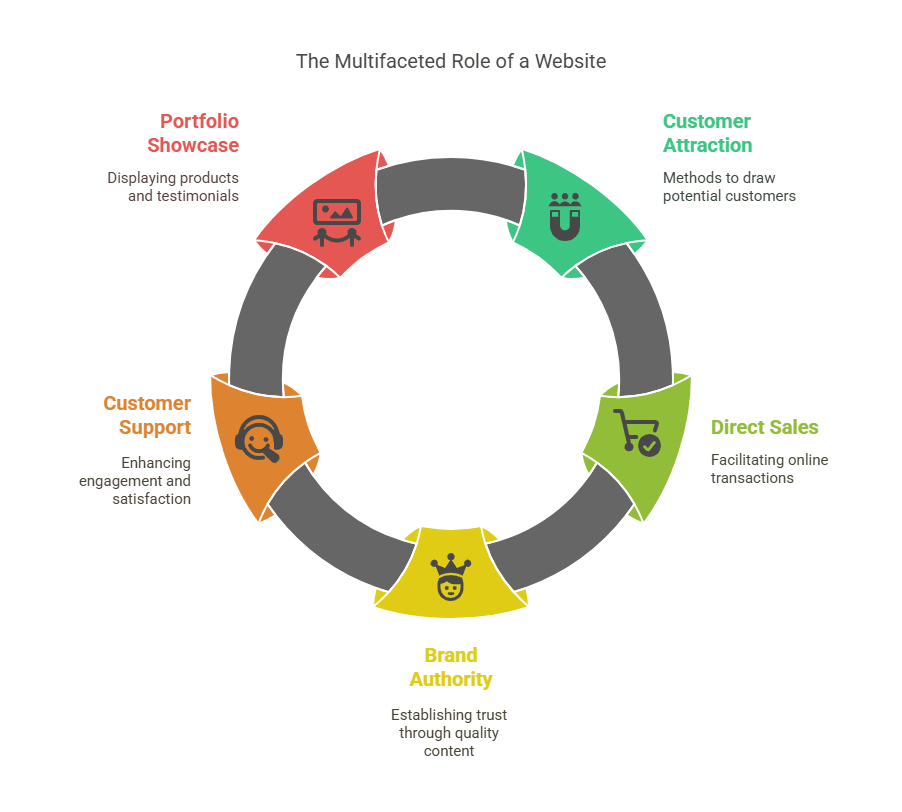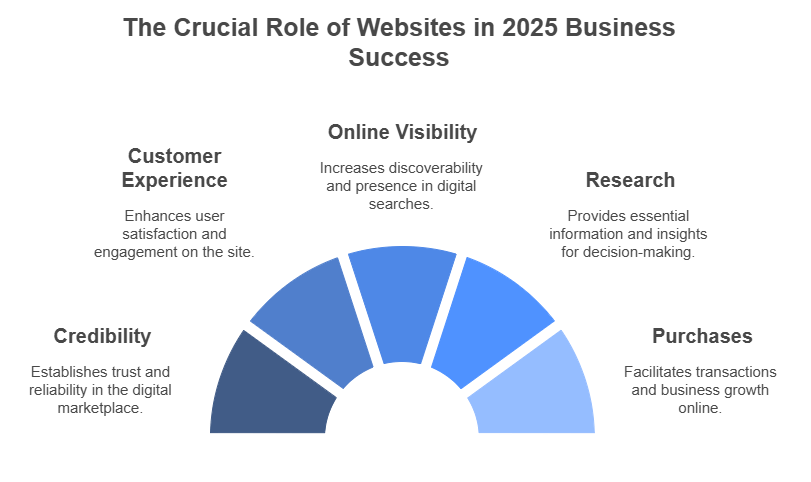
The Digital Age: Why Websites Matter More Than Ever
In today’s fast-evolving digital landscape, having a website is no longer optional—it’s a necessity. Consumers expect brands to have a strong digital presence with more businesses shifting online. Whether you’re running a local business or an international brand, a well-optimized website can drive sales, build credibility, and enhance customer engagement.
Are Websites Still Relevant in 2025?
Many business owners ask, “Do I really need a website when I can use social media?” The short answer is yes! While social media platforms are great for engagement, they do not offer the same level of control, branding, and long-term benefits as a website. Search engines like Google drive billions of searches daily, and if your business isn’t online, you’re missing out on a huge opportunity.
Do I Need a Website for My Small Business?
The Shift in Consumer Behavior
More than 85% of consumers search online before making a purchase. Whether someone is looking for a local service, a product, or business information, their first stop is often Google. If your business doesn’t have a website, you’re invisible to these potential customers.
How a Website Boosts Credibility and Trust
A professional website makes your business look legitimate and trustworthy. Consumers associate a well-designed website with professionalism and reliability. Without one, potential customers might assume your business isn’t credible or even question if it’s real.
Competing with Larger Brands
Small businesses often struggle to compete with big brands, but a strong online presence levels the playing field. With SEO-optimized content, even a small business can rank on Google and attract customers looking for its products or services. A website helps you build authority, showcase customer testimonials, and highlight your unique selling points.
What Are the 5 Uses of a Website?
A website is more than just an online presence—it’s a powerful tool that can serve multiple business functions. Here are five key uses of a website in 2025:

1. Lead Generation and Customer Acquisition
A website helps attract potential customers through SEO, content marketing, and lead capture forms. By optimizing your site for search engines and using tools like landing pages and email sign-ups, you can convert visitors into paying customers.
2. Online Sales and E-Commerce Growth
With e-commerce booming, having a website allows businesses to sell products and services directly to customers. Whether you run an online store or offer booking services, a website ensures smooth transactions and a better customer experience.
3. Brand Awareness and Authority
A well-structured website positions your business as an industry leader. Through high-quality content, blogs, and case studies, you can showcase expertise and attract a loyal audience who trusts your brand.
4. Customer Support and Engagement
Websites provide an easy way for customers to reach out through contact forms, live chat, FAQs, and help centers. This improves customer satisfaction and reduces the workload on your support team.
5. Showcasing Products, Services, and Testimonials
Your website acts as a portfolio where customers can learn about what you offer, see real testimonials, and explore case studies. This builds trust and encourages them to choose your business over competitors.
Is It Still Worth Having a Website?
With the rise of social media, many business owners wonder if websites are still necessary. The answer is a resounding yes! Here’s why:
The ROI of a Business Website in 2025
A website is one of the highest-ROI investments you can make. Unlike social media pages that rely on shifting algorithms, a website gives you full control over branding, SEO, and customer interactions.
How Websites Outperform Social Media Alone
While platforms like Instagram and Facebook are great for engagement, they don’t replace a website. Social media accounts can be deleted, restricted, or suffer from low organic reach, but a website remains your permanent digital asset that you own and control.
Case Studies: Businesses Thriving with a Website
Companies that invest in websites consistently outperform those relying solely on social media. Businesses that integrate SEO and content marketing into their websites generate 3x more leads than those that don’t.
What Are 5 Reasons Someone Might Visit a Given Website?
People visit websites for various reasons, and understanding these motivations can help businesses create a more engaging and user-friendly experience. Here are five key reasons someone might visit a website in 2025:

1. To Learn More About a Business or Service
Before making a purchase, customers research businesses online. A website provides essential information like company history, services, pricing, and contact details, helping potential customers make informed decisions.
2. To Make a Purchase or Book an Appointment
E-commerce and service-based businesses benefit greatly from websites because they provide a seamless way for customers to buy products or schedule services. Online booking systems, payment gateways, and order tracking features make the buying process easier and more convenient.
3. To Read Valuable Blog Content or Get Information
Websites that offer educational content, industry insights, or how-to guides attract more visitors. Blogging helps businesses establish authority while improving SEO rankings, bringing in organic traffic from search engines.
4. To Contact Customer Support or Find Business Details
Many visitors go to websites looking for customer support, FAQs, or business contact details. A well-organized contact page, live chat, or chatbot can improve user experience and increase customer satisfaction.
5. To Check Reviews and Testimonials
Trust is a major factor in purchasing decisions. Customers often visit a website to read testimonials, case studies, or reviews before deciding to buy. Featuring authentic customer feedback on your website builds credibility and encourages conversions.
Are Websites Still Relevant in 2025?
With the rise of new digital platforms, some businesses question whether having a website is still necessary. The answer? Absolutely! Here’s why websites remain crucial in 2025:
AI, Mobile Optimization, and The Future of Web Design
Modern websites are more advanced than ever, incorporating AI-powered chatbots, voice search optimization, and mobile-friendly designs to enhance user experience. Businesses that invest in these technologies will stay ahead of the competition.
The Rise of E-Commerce and Online Services
E-commerce sales continue to skyrocket, and businesses without an online store risk losing potential customers. A website allows companies to sell globally, automate transactions, and offer a seamless shopping experience.
How Websites Complement Social Media Marketing
Social media platforms change frequently, with algorithm updates affecting reach and engagement. A website provides stability and acts as the central hub for all online marketing efforts, ensuring customers always have a place to find your business.
Conclusion

The Competitive Edge of Having a Website in 2025
In an increasingly digital world, having a website is no longer just an option—it’s a business necessity. Whether you’re a small business, a freelancer, or a large corporation, a website provides a 24/7 online presence, builds credibility, and helps you attract more customers. Unlike social media, which is subject to algorithm changes and platform restrictions, your website is a long-term asset that you fully control.
If you don’t have a website yet, now is the time to invest in one. With user-friendly platforms like WordPress, Wix, and Shopify, building a website is easier than ever. For businesses looking to create a professional, SEO-optimized website, working with a web design expert can ensure the best results.
By leveraging SEO, content marketing, and mobile-friendly design, your website can become your most powerful marketing tool in 2025 and beyond.
